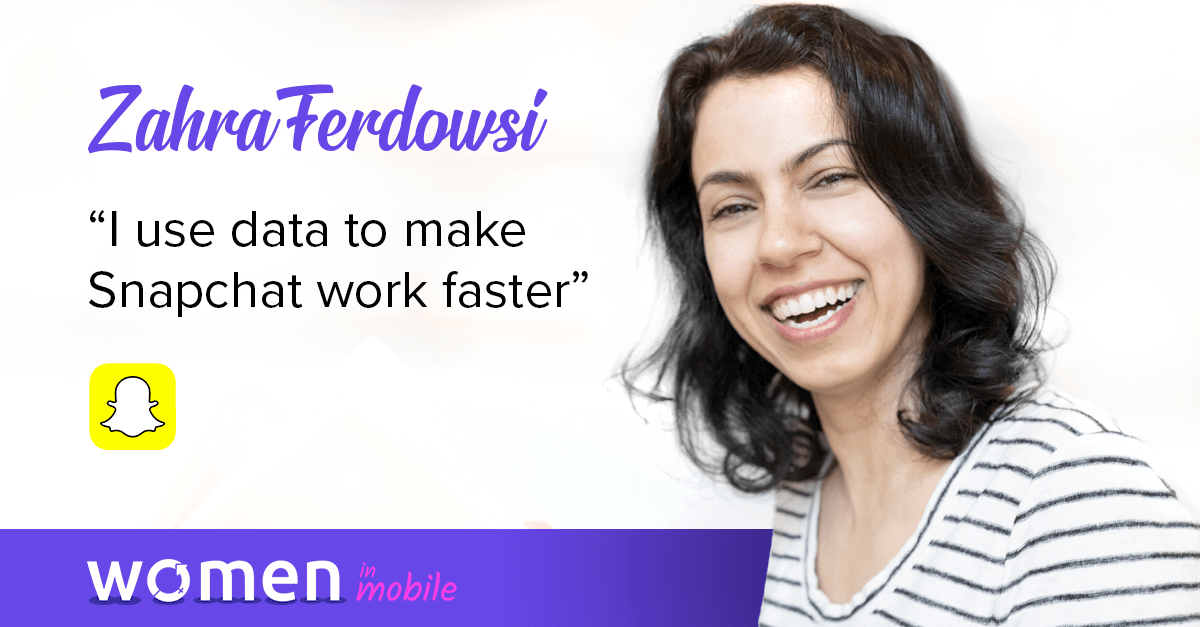This article is part of Liftoff’s Women in Mobile series in partnership with mBolden, a non-profit organization dedicated to helping women get connected, stay inspired and become empowered through content and events.
In the past 27 years, the percentage of women working in engineering and computer science has dropped from 32 percent to 25 percent. Despite the growing number of “women in tech” initiatives, it’s a troubling trend. We asked Snapchat’s data scientist Zahra Ferdowsi why the numbers are so low, how she became one of the very few women with a PhD in machine learning, and what can be done to boost the number of women in engineering and sciences.
How did you decide to pursue a career in data science?
Growing up, I spent a lot of time with my uncle, a software engineer. He built computer games and we tested them together, finding issues in the code and fixing them. Way before I learned what computer science was, I was fascinated by how my uncle could change just two lines of code and make the game work differently. He inspired me to study computer science in college.
It wasn’t until my first college internship that I knew I would focus on data science. I interned at a business consulting company and was once invited to a senior management meeting. The company was launching a new service and needed to figure out which subset of users (a few million total) would be most interested in using the new service. The answer would inform the larger marketing strategy. At the time, I didn’t know a thing about data mining, analytics or machine learning; I just knew that I would like to solve business problems of this type.
That motivation drove me to study data science, and I chose a PhD program in machine learning. After graduating from DePaul University, I worked at Groupon in Chicago for four years before moving to LA and joining Snapchat almost three years ago.
What challenges have you faced in the industry traditionally dominated by men?
I was born in Iran and until I moved to the United States for grad school, I wasn’t fully aware of these challenges. Engineering is a very popular career choice among women in Iran, with the female/male ratio for STEM majors in college nearing 50/50.
Although outside of college and in the “real world,” the challenges for women in tech are more similar between Iran and the USA. Men usually get promoted faster and easier. At the top of the career ladder, most engineers are historically men. Promotions and access to mentorships are sometimes affected by friendships and how good you are at promoting your work on your team or within the larger organization. If you are the only woman on a team of ten people, sometimes that becomes a challenge. A lot of the time it’s unconscious: people just like working with people who are similar to themselves.
What do you see as some of the best and worst initiatives designed to promote women in tech?
I don’t know of any bad initiatives. Among the best ones that stand out is the Grace Hopper Conference, the largest conference for women in tech. I’ve attended a few times, and every time I come back home inspired and energized. Such initiatives help women build their network, meet collaborators, and find jobs.
At the same time, we need more initiatives that solve the root cause of gender inequality in tech, which starts much earlier. As I mentioned, in Iran, engineering is a popular profession among women. A Computer Science degree allows women to easily find jobs in convenient and safe locations in large cities. When I moved to the USA 10 years ago, I saw the difference.
Unfortunately, the number of women in STEM haven’t changed much since then. Teenage girls who study mathematics and science are seen as “uncool.” I’ve seen it with my friend’s daughter who loved solving math puzzles when she was seven and then started showing less and less interest in sciences as she was growing up. The stereotype that girls who like working with numbers are geeky is affecting kids here. We need more mentors and initiatives to support kids who love science to make a real difference in the tech industry.
Who is your biggest career inspiration in the industry?
My biggest inspiration in data science is Rayid Ghani, a professor at the University of Chicago and the Chief Scientist of Barack Obama’s presidential campaign in 2012. He was a great mentor to me when I was an Intern at Accenture Technology Labs and later during my PhD studies as he became a member in my PhD committee. His current research focuses on applying data science to large-scale social problems in education and healthcare, such as predicting lead poisoning in Chicago neighborhoods.
Is there one piece of advice you wish somebody gave you at the beginning of your career?
I wish somebody told me not to give up too soon when I was learning something new. As women, we might fear failure and feel more pressure to be perfect. When I was younger, I thought that if I didn’t understand something quickly then I just wasn’t good at it. Now I know that the learning curve might be a little different for different people, and it’s okay to not be perfect, and that by failing more you actually learn more.
Fun fact about you that few people know?
I hiked Mount Damavand, the highest mountain in Iran, about 5,600 meters high. When I started the trip, I didn’t think I would actually be able to finish. But I went with a good group of people and a great leader, so we did it together. That trip made me fall in love with hiking and inspired many more long mountain hikes. When you step outside of your comfort zone, it gives you so much energy and enthusiasm in all areas of your life.

